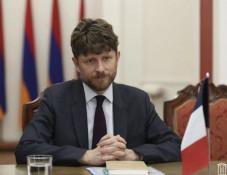
Iran-Armenia relations not to undergo significant changes following Iran’s presidential elections – expert
Iran-Armenia relations will not undergo significant changes following the presidential elections in Iran, Head of Iranian Studies Chair of Yerevan State University’s Faculty of Oriental Studies Vardan Voskanyan said at a press conference on Wednesday.
To note, Iran’s presidential elections are scheduled on 19 May with the participation of 6 candidates.
In the words of Vardan Voskanyan, the presidential elections feature two political wings – conservatives and reformists. Current President of Iran Hassan Rouhani, Vice President Eshaq Jahangiri and former Minister of Industry Mostafa Hashemitaba are among the reformist candidates. The rest of the candidates – Mohammad Bagher Ghalibaf, Ebrahim Raisi and Mostafa Agha Mirsalim – are the conservative politicians.
Mr. Voskanyan noted it can be assumed from the current political situation in the country that the two camps will hold quite an intense competition. As he noted, the presidential candidates have already held a television debate, which focused on Iran’s domestic political and economic issues, as well as the relations between Iran and the West.
Speaking about Iran-Armenia relations, the expert on Iranian studies noted that it is important to have the clear understanding that Iran’s foreign policy line with Armenia is not connected with the success of any of the candidates.
“The election of any of the candidates will not mark significant changes in that policies, with slight corrections to be made certainly. For this reason, it is hard to point out any candidate’s acceptability in terms of Armenia’s interests,” Vardan Voskanyan highlighted.
He also added that the elections are supposed to be completed in two rounds.
Turning to the stance of the Armenian community in Iran regarding the presidential elections, Mr. Voskanyan underscored the huge differences between that community and other Armenian communities (in France, U.S.).
“The Iranian Armenians never back any of the candidates. They are free to vote in favour of a candidate at their own position, i.e. we do not have classic lobbyism in Iran. However, the majority of the Iranian Armenians side with the reformists, which does not imply that none of them backs the conservatives,” the expert underlined.
He stated that being an Armenian in Iran is an advantage in some sense, with the Armenian community enjoying special attention and respect among the Iranian people.
“Thus, the elections will not change this attitude towards the Armenians. Certainly, it should be noted that the Armenian community [in Iran] deserve it,” V. Voskanyan highlighted, adding that all the victories of the country have been achieved due to the support of the Armenian community.
“We should also express such an attitude towards the Iranian people,” the expert concluded.
Newsfeed
Videos






























